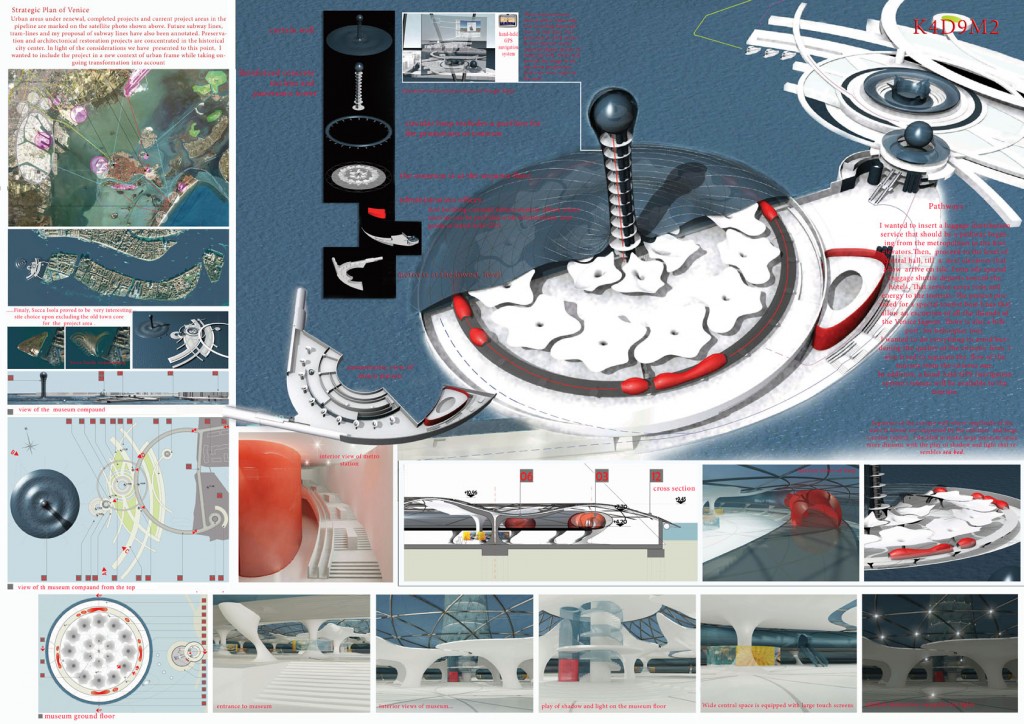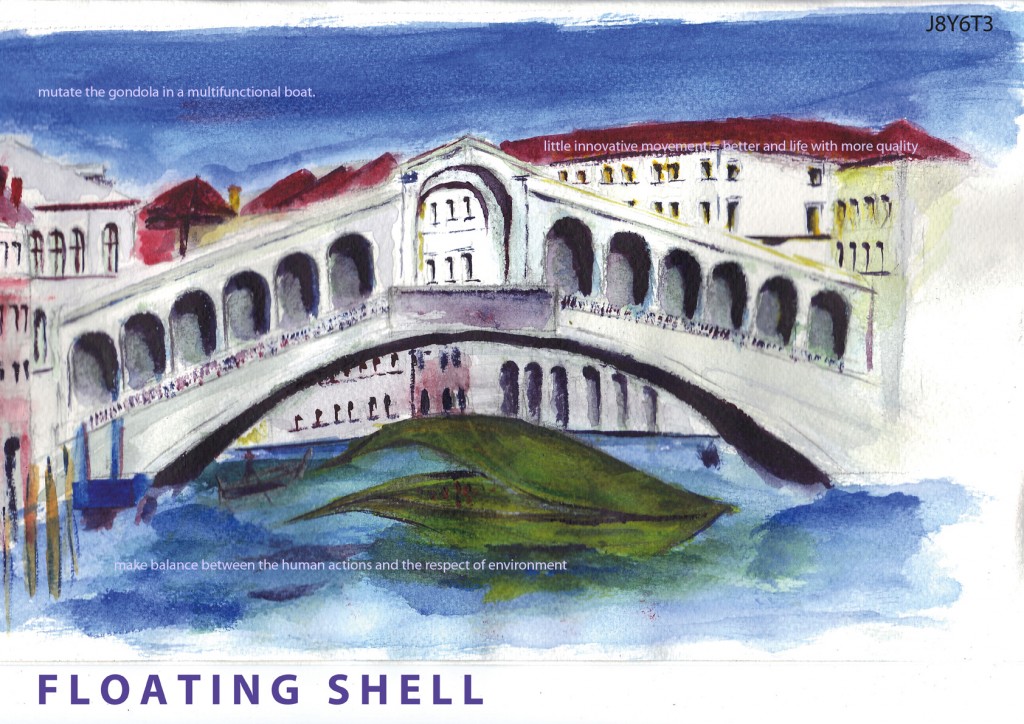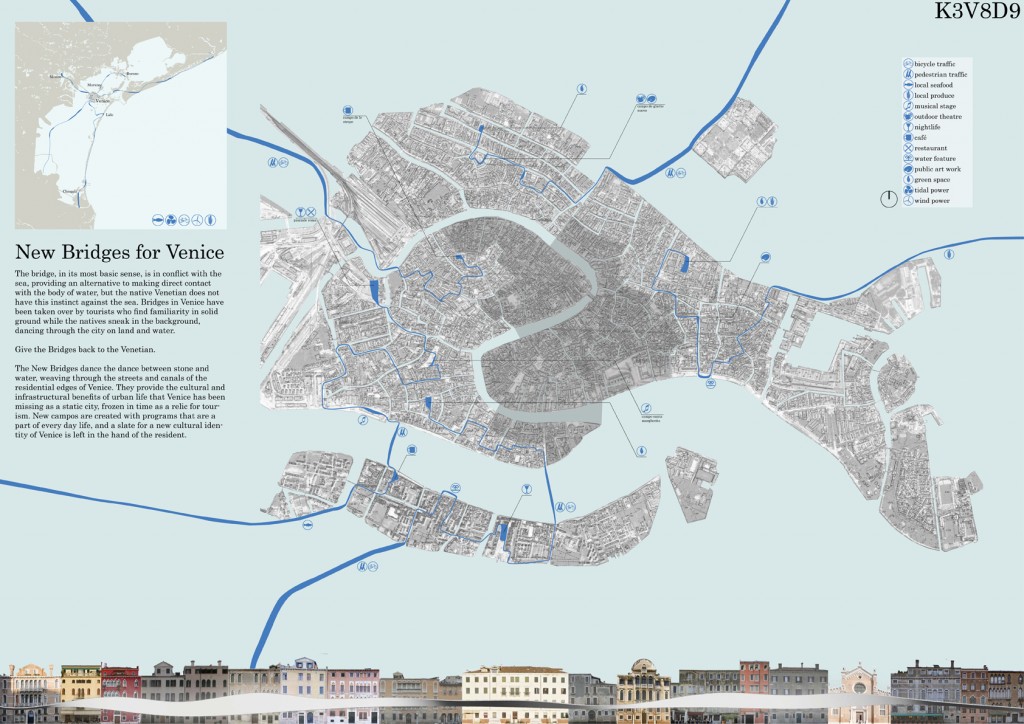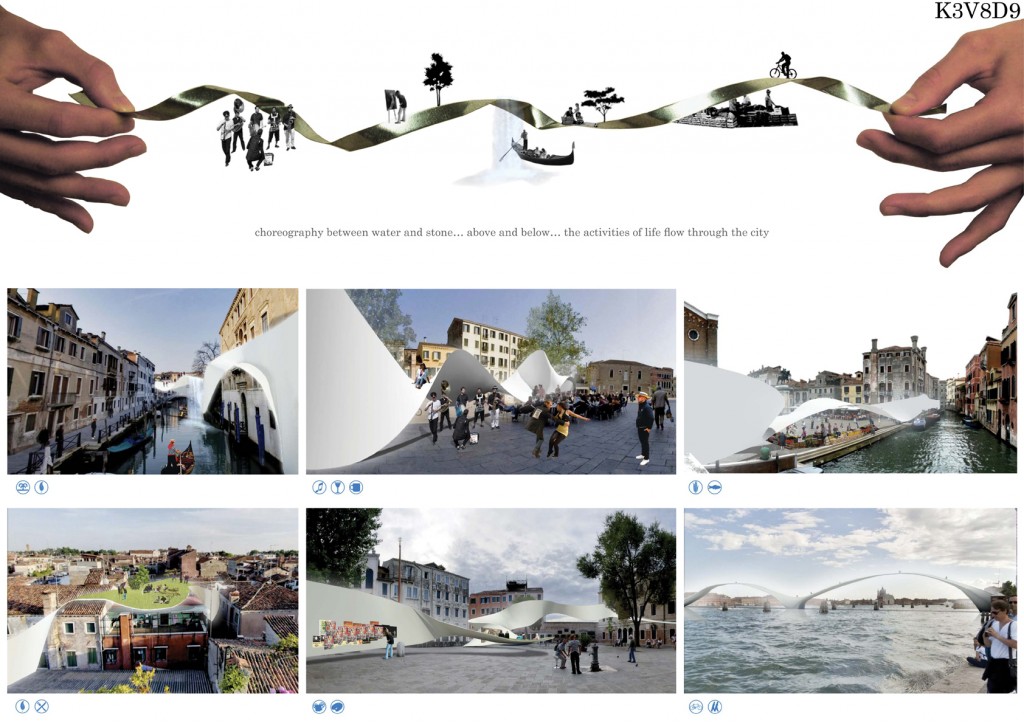Info:
Title: New bridges for Venice - Code: K3V8D9Contest: Venice / 2011
By: C. Carpenter / D. Shin / G. Rock
Views: 3995 Likes: 4
Votes:
BJARKE INGELS5 NERI OXMAN7 ELENA MANFERDINI3 MARIA LUDOVICA TRAMONTIN4 BOSTJAN VUGA75.2
New bridges for Venice
NEW BRIDGES FOR VENICE // Venice, a city whose historical progression and settlement has been defined by mediating between water and land, city and sea, has been aided by the role of the bridge. But, Venice has become a static city, frozen in time as a relic for tourism. Venetians both economically rely on and rhythmically avoid the tide of tourists. The center of the city becomes clogged with the stop and go of tourism instead of the flow of life. Deterred by high living costs brought on by luxury hotels and second homes, the remaining Venetians are forced to the outskirts of their own city and ultimately onto the mainland. The proposal gives the bridge back to the Venetian as a communal programmatic asset that moves through the city in the same language as the native Venetian.
INTEGRATION WITHIN CITY//
The implementation of the proposal maximizes programmatic effect while minimizing intrusiveness to the historical city. Thin vertical strips fit carefully into existing canals and sidewalks; upon entering an open space such as a fondamenta, campo, or piazza, the strips twist to accommodate various programs for the residents. These vertical surfaces reside in Venetian-majority neighborhoods, avoiding the touristic San Polo and San Marco.
INTEGRATION WITHIN LAGOON//
Upon reaching the threshold of the city, the vertical strips twist to become horizontal bridges. These five bridges connect the meandering streets of Venice to surrounding territories of the lagoon:
- Venice to Mestre via Porto Marghera on the mainland, allowing for commuting
- Venice to fish farms around Lago dei Stradoni, Valle Zappa, and Valle di Millecampi, allowing seafood transportation and electricity generation
- Venice to Chioggia via Lido and Pellestrina, creating a bike trail around the seaside
- Venice to Burano via Isola San Michele, Murano, and Mazzorbo
- Venice to Jesolo via Sant’Erasmo and Cavallino-Treporti, allowing agriculture transit
The natural growth of a city to make physical connections with its resources has not happened with Venice. This allows for the opportunity to create the instant evolution of Venice as an urban center while remembering the lessons learned from urban sprawl, extending only the necessary lines to resources within the lagoon, to maximize the efficiency of the city, and providing physically and environmentally unobtrusive connections.
ECOLOGICAL SUSTAINABILITY//
BIKE, NOT BOAT/ The principal mode of transportation between lagoon islands is gasoline-powered motorboats. The lagoon is a delicate and fragile marine ecosystem that contains an incredible array of sea life. Scientific research has linked motorboat traffic to the disruption and killing of zooplankton. These species, including shrimp, jellyfish, and crustaceans, are incredibly integral to the economy and traditional cuisine of the Venice region. Motorboats also contribute to local noise pollution as well as excessive carbon-dioxide emissions around the lagoon.
The proposal seeks to allow the same freedoms of personal, non-vehicular transportation of Venice by extending bridges to the city’s most important neighbors—Mestre, Murano, Burano, Lido, Chioggia, and Jesolo. These horizontal bridges accommodate bicycle and pedestrian pathways to instigate interisland connectivity. Instead of polluting and destroying the lagoon’s ecology, the bridges act as a scaffolding to promote leisure and fitness.
Other ways of addressing the lagoon’s impact on the environment include renewable energy production. The Venetian lagoon’s proximity to the Adriatic Sea provides a number of natural systems that can be harvested. Along the length of the horizontal bridge between Venice and the fish farms to the southeast, turbines to harness wind and tidal power are placed to reduce the area’s reliance on non-renewable energy sources.
RESIDENTIAL APPEAL//
The New Bridges for Venice are aimed at allowing residents to customize and gain control over the systems in their city. Many of the city’s major squares, parks, markets, and cultural amenities are exhausted and overrun by tourists, leaving residents few options to relax in their own city. Some of the suggested programs to be implemented along the strip’s course include but are not limited to parks, cafés, restaurants, outdoor theatres, fountains, nightclubs, open-air markets, and music stages.
The system of New Bridges creates a new identity for the native Venetian while providing many of the cultural and infrastructural benefits of urban life that Venice has been missing.
Related Posts :
Comments:
Info:
Title: New bridges for Venice
Time: 6 giugno 2011
Category: Venice
Views: 3995 Likes: 4
Tags: Adriatic Sea , Burano , C. Carpenter , Cavallino-Treporti , D. Shin , G. Rock , Jesolo , Marghera , Pellestrina , Venetian Lagoon , Venice








